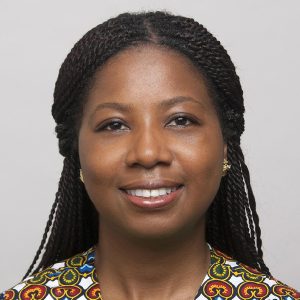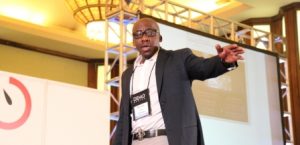 When you realize your career is a journey rather than a destination, inspiration often comes when you least expect it. Some of us are wired to think that when I get “X” title or “Y” title, I would have achieved my career objective. Then when we get there, we still feel unfulfilled. Evita’s story is a reminder to keep an open mind, follow our curiosities, and be open to learning a new skill. I’m excited to feature Evita Grant on the first F.I.V.E Questions of 2018. It brings me joy to celebrate #BlackExcellence, and even more joy to celebrate #BlackGirlMagic.
When you realize your career is a journey rather than a destination, inspiration often comes when you least expect it. Some of us are wired to think that when I get “X” title or “Y” title, I would have achieved my career objective. Then when we get there, we still feel unfulfilled. Evita’s story is a reminder to keep an open mind, follow our curiosities, and be open to learning a new skill. I’m excited to feature Evita Grant on the first F.I.V.E Questions of 2018. It brings me joy to celebrate #BlackExcellence, and even more joy to celebrate #BlackGirlMagic.
- Briefly describe your background- education, experience, etc. What is the most exciting or rewarding aspect of what you do now?
My name is Evita Grant. I was born and raised in Ghana. I was fortunate to attend Ghana International School which exposed me to diverse people of different backgrounds and cultures.
I moved to the US in my late teens to attend MIT for my undergraduate studies. I majored in Chemical Engineering because it encompassed my favorite courses from secondary school – Math, Physics, and Chemistry, and it provided me with a skill set that I believed I could apply in Ghana to contribute to its economic development.
For the summer following my sophomore year, I conducted research in the lab of one of MIT’s 12 Institute professors, Professor Daniel Wang. The following year, I interned at a major pharmaceutical company. Both experiences piqued my interest in bio-engineering and academia. Upon graduation, I enrolled in the Harvard-MIT Health Sciences and Technology (HST) program for my doctoral degree, instead of working at a major consulting company.
The HST program is indeed one of a kind. Its Ph.D. students take first- and second-year medical school coursework with Harvard Medical School students, and intern for several weeks at a Harvard-affiliated hospital, in addition to satisfying the traditional engineering program requirements. I learned a great deal about medical sciences and the US healthcare industry. The HST program also afforded me the opportunity to work with the late Norman Letvin on HIV vaccine development. Even though I was an engineer amongst immunologists, virologists, and physicians, my lab members were incredibly supportive and collaborative. My thesis focused on the use of Polyethylenimine, a type of polymer, to modulate immune responses to DNA vaccines.
During my doctoral studies, I realized that I did not want to pursue a path in academia or research. So to satisfy one of my HST medical requirements, I volunteered for four weeks at a public maternity hospital in Rabat, Morocco. My time in Morocco allowed me to focus on what I truly wanted for my career – to assist in Africa’s development, which was a burning passion of mine.
When I returned to the US, I focused on completing my doctoral program while exploring alternative careers. I was drawn to Intellectual Property (IP), in particular patent law, because it spurs and supports innovation. Sadly, most African countries have a weak patent protection system. I believed I could contribute to building new legal and non-legal infrastructures, and strengthening existing ones to support innovation and technology transfer in Africa.
After graduating, I worked as a scientific advisor at an IP boutique law firm for a year, then enrolled at Harvard Law School. Law school was very different from my STEM bubble of MIT and Harvard. For the first time in my life, I was forced to think more critically about race, social constructs, global trade, and Africa’s future. It was enlightening, and provided personal meaning to the popular word “woke.”
After I graduated, I moved to Silicon Valley to join Wilson Sonsini Goodrich & Rosati PC as an intellectual property attorney. My practice focuses on working primarily with startups in the Life Sciences and MedTech space to develop and monetize their IP portfolio. It is incredibly rewarding to work with founders and inventors who are passionate about improving people’s lives through their inventions. It brings me great joy and satisfaction to assist them in achieving their goals.
- Flash back and then fast forward to the present, what has surprised you the most about your journey thus far? What advice do you have for others looking to take a similar path?
I am most surprised by how unpredictable my journey has been. I went from being a chemical engineer to being a medical engineer, to being a lawyer. I would never have predicted this journey when I left home in my late teens.
My advice will be to be open to new uncharted paths. My experiences have been instrumental in my personal evolution. And I don’t think I would have done it any differently.
- Why is the cause you are pursuing or problem you are solving the most important for this generation? How would future generations benefit if it’s successful? What is at risk if you do not succeed?
I am currently interested in using mobile technologies to better connect African countries, and non-African countries for trade purposes. Connected African economies should contribute to the growing economic development of Africa. Frankly, there is no risk of failing because it will be an enriching experience that will add to my growth and expose me to new opportunities.
- Reflect on all of the key sacrifices and trade-offs you’ve had to make to get to where you are today. Which of these would you say was the most pivotal and why?
I think the greatest sacrifice is living in the US away from my family. I miss home (Ghana) all the time. That said, I have gained many personal and professional experiences during my stay in the US. It has been worth it.
- What is the best piece of actionable advice that you’ve received that continues to be a source of inspiration in good times and challenging times?
 Bet on yourself! I cannot remember who or when I received this piece of advice. I may have heard it on a sports podcast. I always remember it whenever I have doubts about myself and/or the future. Choosing to believe in me and to put myself in the position to succeed has been a source of motivation and inspiration.
Bet on yourself! I cannot remember who or when I received this piece of advice. I may have heard it on a sports podcast. I always remember it whenever I have doubts about myself and/or the future. Choosing to believe in me and to put myself in the position to succeed has been a source of motivation and inspiration.
You can connect with Evita via LinkedIn!


